The last three years have been a unique moment in the history of the Chinese Christian community in Britain. The UK government announced the British National (Overseas) Visa Scheme (BN(O)) in July 2020, following the promulgation of the national security law in the city. Approximately 191,000 individuals from Hong Kong submitted applications for the visa program between its initiation in January 2021 and September 2023. The UK Home Office’s Impact Assessment of the BN(O) visa initiative forecasts that between 258,000 and 322,400 Hong Kong residents will migrate to the UK during the initial five years of the program.1
BN(O) Immigration Impact: Transforming the Landscape
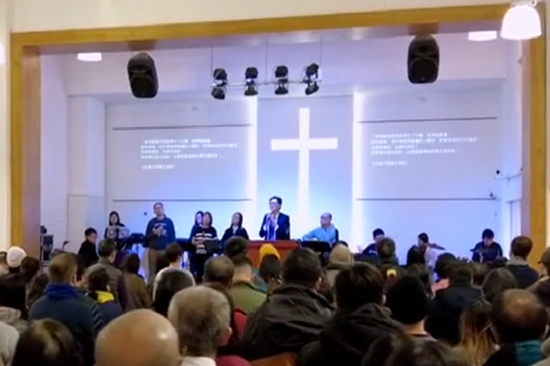
The influx of BN(O) migrants has upended the landscape of Chinese Christianity in Britain as we knew it. Previous research and discussions concerning diasporic Chinese Christian communities have largely been centered in North America. However, another prominent population is now rapidly growing in Britain. At this critical historical juncture, the British and Foreign Bible Society (BFBS) initiated the “Bible and the Chinese Community in Britain” (BCCB) research project in 2022, aimed at developing a comprehensive, data-driven understanding of Christianity amongst the Chinese population.2
Defining Characteristics of the Chinese Christian Community
The BCCB has recently published its initial reports, which identify three defining characteristics (dynamic, decentralized, and diverse) of the Chinese Christian community in Britain as it stands today.3
Dynamic
The 2021 census reveals that, for the first time in history, less than half the population (46.2%) in England and Wales now describe themselves as Christians. The narrative behind the numbers cannot be simply encapsulated by the word “decline.” In contrast to many historic churches such as the Church of England and the Church of Scotland, there is a trend of revival in independent evangelical churches, Pentecostal churches, and churches belonging to various ethnic minorities. A prime example of this trend is the incredible growth rate of Chinese churches, which far surpasses that of other groups.
Between 2021 and 2023, Chinese congregations experienced an impressive estimated mean annual growth rate of 28.8%, surpassing the second-ranking Romanian Orthodox Church by almost twenty percentage points. In this period, a remarkable 32 new Chinese churches, congregations, and Christian organizations emerged nationwide. It’s noteworthy, however, that the substantial growth primarily occurred within Cantonese-speaking communities due to BN(O) immigration, while the sizes of Mandarin and English congregations saw no significant changes.
The majority of Chinese people in the UK still have no religious affiliation (62.4%). Approximately 18.0% are Christians, which is 8.5% higher than the second-largest religious group, Buddhists. Notably, this 18% proportion also exceeds the percentage of Christians in Mainland China, Hong Kong, and Taiwan.
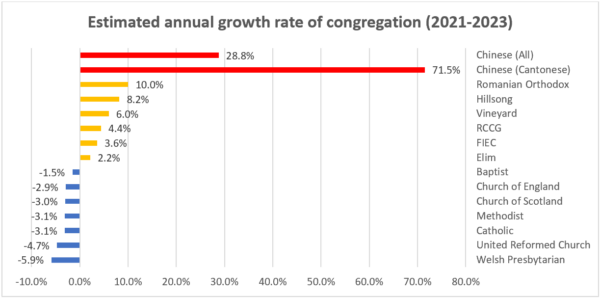
Decentralized
In 1951, Rev. Stephen Y. T. Wang founded the first notable Chinese Christian congregation in post-World War II Britain, namely the Chinese Church in London (CCIL). Subsequently, a series of Chinese Christian Churches (CCCs) were established across the UK. Today, if you visit any Chinese church with the suffix “CCC,” it is highly likely to be the first Chinese church in that local area. However, most Chinese churches including the CCCs, maintain a significant degree of independence in terms of their ministry, structure, and finances.
Although the term “Chinese church” is frequently used in many articles, including this one, it’s important to recognize that Chinese churches in the UK and abroad are quite decentralized. A major reason for this is that most Chinese churches are independent congregations, not affiliated with any specific denominations. Three in five of the 202 Chinese congregations and church organizations in Britain labelled themselves as “non-denominational.” The largest denominations include Alliance, Methodist, and Elim.
The arrival of BN(O) immigrants has also led to two unique forms of churches. The first includes 10 churches founded by BN(O) Christian leaders. These churches often present distinct political and social stances, rooted in their experiences in Hong Kong, creating an observable contrast with the existing Chinese churches in the UK. The second category comprises what might be termed “nested” groups. These are Chinese sub-congregations within non-Chinese churches. The majority of these host churches participate in the “Welcome Churches” program, which aims to prepare churches to become “Hong Kong Ready.” This initiative, detailed at www.UKHK.org, focuses on encouraging and training churches to extend a warm welcome to newcomers from Hong Kong.
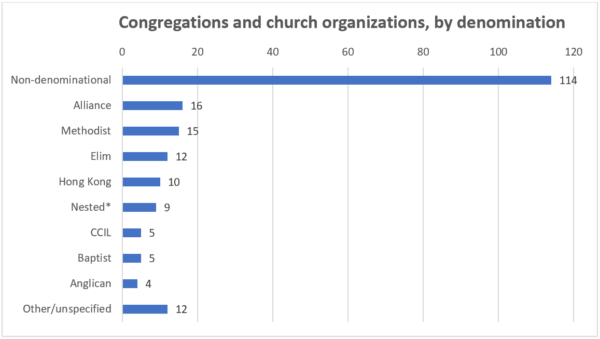
Diverse
Seeking an in-depth understanding of Chinese churches, one must recognize that this group is highly diverse. Let’s initiate this with two fundamental aspects.
Firstly, the Chinese church in the UK is a typical transnational, immigrant-majority church, with only 12.3% of its believers born in the UK. It is predominantly comprised of first-generation immigrants, and its structure is closely linked to the government’s immigration policy.
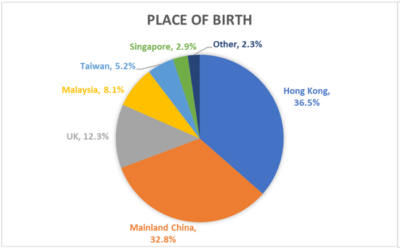
From the early twentieth century, the internationalization of the UK’s universities attracted a large number of international students from mainland China, leading to rapid growth in Mandarin ministries and churches. However, following the introduction of the BN(O) route, the size of Cantonese congregations in Chinese churches has gradually overtaken Mandarin congregations in the last two years. Nevertheless, both mainland Chinese and Hong Kong-background believers only constitute about a third of the total population. Many Chinese believers also come from Southeast Asia, such as Malaysia and Singapore, and these backgrounds are often overlooked in discussions about Chinese churches.
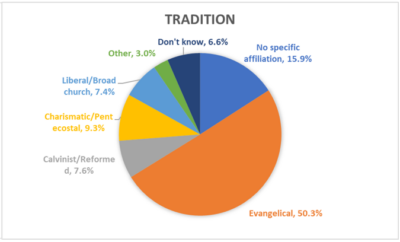
Additionally, even though Chinese churches in the UK often identify themselves as “Evangelical,” our data do not entirely support this claim. Among all Christian respondents, only half believe that their faith follows the Evangelical tradition. While this is a significant proportion, it also means that the other half do not identify as Evangelical Christians. Nearly a quarter are uncertain or unwilling to be categorized into any particular tradition. The church demographic surveys show that the most rapidly expanding branch of Chinese Christians is now those with a Charismatic/Pentecostal background. These shifts underscore the need for continual monitoring and updating of our understanding of the evolving Chinese church.
Social scientists often explore religious phenomena using three distinct dimensions: believing, belonging, and behaving. In the light of this framework, it is evident that Chinese believers and churches exhibit significant differences (and even conflicts) in personal faith, church involvement, and social activities. My upcoming articles will delve deeper into these differences, exploring their causes and impacts.
Endnotes
- Melanie Gower, Esme Kirk-Wade, “Hong Kong British National (Overseas) Visa,” Briefing Paper Number CBP 8939, May 5, 2021, accessed February 16, 2024, https://commonslibrary.parliament.uk/research-briefings/cbp-8939/.
- The BCCB collected data from a national survey of 1,179 ethnic Chinese respondents, interviews with 45 church leaders, and 71 church demographic surveys.
- For full research highlights, see Hazel Southam, “Chinese Church Is the Fastest-Growing in the UK, Report Finds,” British and Foreign Bible Society, October 22, 2023, accessed February 16, 2024, https://www.biblesociety.org.uk/latest/news/chinese-church-is-the-fastest-growing-in-the-uk-report-finds/.
Image credit: Marta Matyszczyk via UnSplash.

Yinxuan Huang
Dr. Yinxuan Huang is a research manager at the British and Foreign Bible Society. He was research fellow and coordinator for the Bible and the Chinese Community in Britain research project at the London School of Theology (2021–23), His main research interests are in sociology of religion, Chinese Christianity, East …View Full Bio
Are you enjoying a cup of good coffee or fragrant tea while reading the latest ChinaSource post? Consider donating the cost of that “cuppa” to support our content so we can continue to serve you with the latest on Christianity in China.